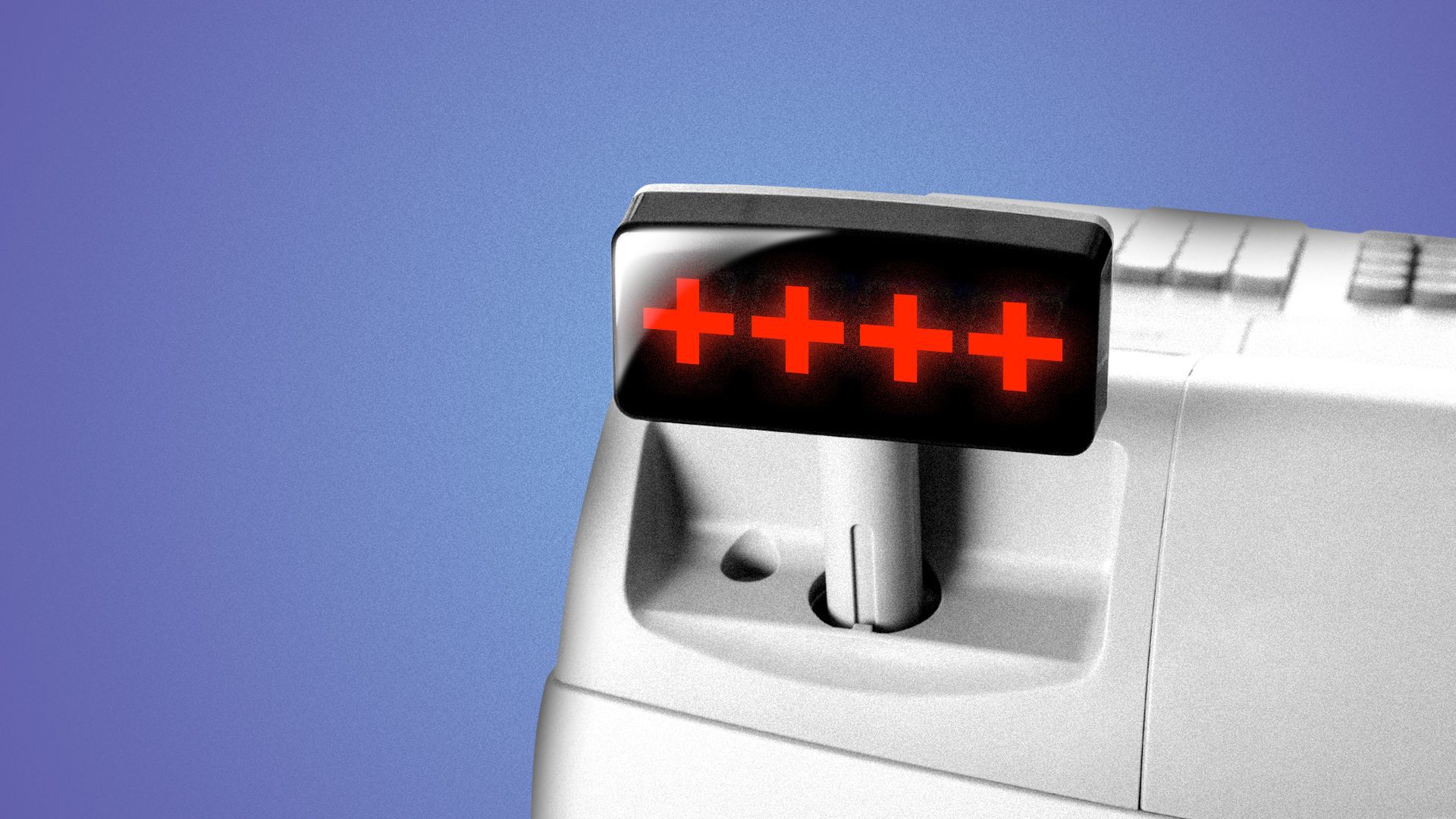| |
| |
| |
| Presented By AHCA/NCAL |
| |
| Axios Vitals |
| By Adriel Bettelheim · Feb 24, 2023 |
| We made it to Friday, Vitals friends. Today's newsletter is 995 words or a 4-minute read. |
| |
| |
| 1 big thing: Ukraine's growing mental health crisis |
 |
|
| Photo illustration: Sarah Grillo/Axios. Photos: Spencer Platt, Mustafa Ciftci/Anadolu Agency via Getty Images |
| |
| A year of Russian bombing, air raid sirens and displacement is taking a heavy toll on Ukrainians' mental health, Axios' Laurin-Whitney Gottbrath reports. The big picture: The World Health Organization estimates that nearly 10 million Ukrainians may be suffering from conditions like depression or anxiety, and almost 4 million may have cases that are moderate or severe. - The scale of the crisis is likely much bigger, said Alisa Ladyk-Bryzghalova, the mental health program lead at WHO Ukraine.
- The estimates don't take into account the number of people who might not meet the criteria for a diagnosis but are still experiencing new daily stresses and distress that come from living with war, Ladyk-Bryzghalova told Axios.
- A survey published by Ukraine's Ministry of Health in October found that more than 70% of people polled said they were very stressed or nervous.
Zoom in: The impact of the invasion on Ukrainian children's mental health is especially acute. - The UN Children's Fund (UNICEF) estimates that 1.5 million children in Ukraine are at risk of depression, anxiety, post-traumatic stress disorder and other mental health conditions.
What's happening: Government agencies, global aid organizations and local groups are trying to address the myriad needs as the war grinds on. - That includes working to integrate mental health services into the country's primary health care system to reach the most people.
- Digital tools have become especially important as the hostilities make it hard for some to find specialists for help.
- And there are on-the-ground efforts involving groups like Project HOPE to provide mental health services to internally displaced children and adults.
Go deeper. |
    |
| |
| |
| 2. Americans fret their well-being isn't made a priority |
| The majority of Americans surveyed in the new Axios-Ipsos American Health Index say businesses and the government don't make citizens' health and well-being a priority, writes Axios' Alison Snyder. The big picture: Mental health is a top concern for Americans — as parents, employers and leaders. - They're spending more money on behavioral health services, while the federal government has allocated new funds for states to expand community behavioral health centers.
- But stigma and a lack of access persist and prevent people from receiving the care they need.
By the numbers: The national survey of 1,213 U.S. adults found the majority of respondents (86%) said their emotional well-being is very good or somewhat good, compared to 13% who said it was poor or somewhat poor. - The same percentage said their mental health is good.
- More Republicans (92%) said their mental health and well-being were good compared to Democrats (85%).
- 18% of respondents said they spoke with a mental health professional or counselor in the past year.
What to watch: 75% of the people surveyed said they somewhat or strongly oppose using AI for mental health therapy, in place of individual counseling. Methodology: This Axios/Ipsos Poll was conducted Feb. 17-21 by Ipsos' KnowledgePanel®. This poll is based on a nationally representative probability sample of 1,213 general population adults age 18 or older. - The margin of sampling error is ±3.0 percentage points at the 95% confidence level, for results based on the entire sample of adults.
|
    |
| |
| |
| 3. Medicaid for food draws mixed reviews |
 |
|
| Illustration: Aïda Amer/Axios |
| |
| Advocates, analysts and policymakers are giving mixed reviews to a Biden administration move to let states use Medicaid funds for food, Axios' Ayurella Horn-Muller writes. Why it matters: Some are glad that Medicaid will be available as an additional tool to address food insecurity and diet-related health conditions, but others see expanding programs like SNAP as the priority ahead of a looming hunger cliff. State of play: In the fall, Arkansas, Massachusetts and Oregon received approval under a Section 1115 waiver from the Centers for Medicare and Medicaid Services for test programs that tap into federal and state funds for health-related social needs. - What that looks like varies per state, but it encompasses nutrition counseling, cooking supplies and meal delivery.
What they're saying: "Medicaid already covers many life-long drugs and therapies. It should pay for food the same way it pays for statins, insulin and other lifetime medications," Adam Shyevitch, chief program officer at Boston-based healthy food nonprofit About Fresh, tells Axios. - Alice Řezníčková, an interdisciplinary scientist who researches food and nutrition security at the Union of Concerned Scientists, says the experiments in using Medicaid funds for groceries are the latest in a "patchwork" of nutrition benefits across agencies and programs.
The other side: The Medicaid pilots could be a new source of relief as pandemic-era SNAP expanded food benefits expire across the country — but some say that shouldn't be an excuse for seeking SNAP cuts. Read the rest. |
    |
| |
| |
| A message from AHCA/NCAL |
| Long term care needs hiring help, not impossible mandates |
| |
 |
| |
| Nursing homes are working hard to recruit caregivers, but they can't find workers. The solution: We need investments in our long term care workforce — not unfunded staffing mandates — to offer better wages, build a pipeline of nurses and bolster staff retention. Learn more. |
| |
| |
| 4. Progress reducing maternal mortality stalls |
 |
|
| Illustration: Natalie Peeples/Axios |
| |
| Declines in maternal mortality rates around the world have stalled in recent years, Axios' Jacob Knutson writes from a new WHO report. Why it matters: An estimated 287,000 women died from pregnancy-related complications in 2020, which is approximately 800 deaths every day — or one every two minutes, according to the report. - The total was higher than expected and out of step with the WHO's goal of reducing maternal deaths to fewer than 70 maternal deaths per 100,000 live births by 2030.
The big picture: Maternal deaths decreased around the world by an average of 2.7% every year between 2002 and 2015. But that fell to -0.04% between 2016 and 2020. The U.S. was among eight countries and territories that experienced "significant" increases between 2002 and 2020, rising from 12 deaths per 100,000 live births in 2000 to 21 deaths per 100,000 births in 2020. - Only two regions — Australia and New Zealand, and Central and Southern Asia — had notable recent declines.
|
    |
| |
| |
| 5. Dog of the week |
 |
|
| Ralph. Photo: Lucie Rosenthal |
| |
| Meet Ralph, an approximately 8-year-old pup from Huntington Woods, Michigan. He's the glue of his family of six, says one of his humans, Vitals reader Lucie Rosenthal. - In his free time, Ralph loves lounging by the windowsill, getting his teeth brushed and going for walks until he gets tired and demands to be carried.
Do you have a furbaby who'd make a great pet of the week? Reply to this email with their photo and some details — and you might see them featured here! |
    |
| |
| |
| A message from AHCA/NCAL |
| The domino effect of failing to support long term caregivers |
| |
 |
| |
| The long term care labor shortage has created bottlenecks in hospitals as patients wait for beds in nursing homes. What you need to know: A federal staffing mandate will worsen the strain by forcing nursing homes to limit their number of residents. We need solutions now. |
| |
| Have a news tip? Just reply to this email. Did someone forward this email? Subscribe here. Thanks for reading, and thanks to senior copy editor Bryan McBournie for the edits. |
 | | Dive deeper into the future of health care | | |
No comments